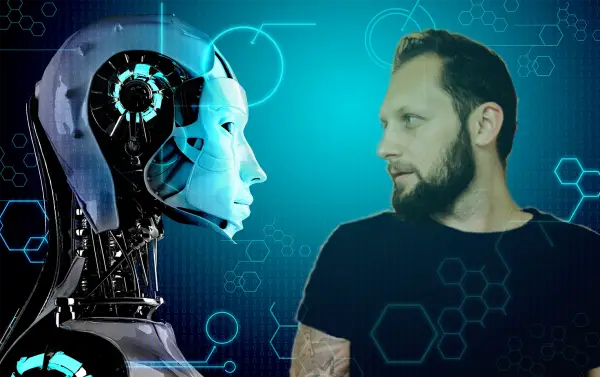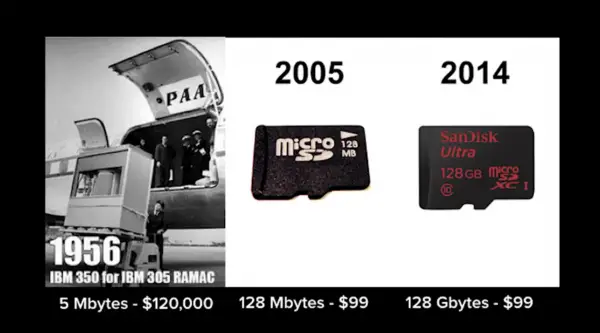Technology Will Change Every Aspect Of Our Lives, Sooner Than You Think

By Mike Sygula,
As someone who has been making a living from the internet for many years and following technological trends closely, I’m baffled with the fact that most people seem to have little understanding of what is coming in terms of technological disruption. This disruption will affect and transform every aspect of our lives and society and is closer than most realise.
Last year, when Bitcoin and cryptocurrency market was gaining a lot of mainstream interest due to its soaring prices, I asked a few locals in London if they know what Bitcoin is. I asked my local barber a cab driver and a guy running the estate agency that I was renting from. The cab driver had some clue, but the other two asked me “if it is some kind of gambling”. It is an example showing how little attention the general population pays to technological changes.
What this exponential growth in technology actually means?
Most people tend to think linearly, so we look at what was before and assume that to have any major changes it might take a while again. However, the way things are moving, especially in technology, is exponential. The computer systems and other technological improvements tend to grow in an exponential manner. This observation has been first made by Gordon Moore – the co-founder of Intel, in 1965. The idea is that things like computing power and the number of transistors in the integrated circuit will double roughly every year. It actually doubles roughly every 18 months, but still, all those predictions were quite accurate.
The best example is if you take 30 steps, if you do it linearly you end up with 30, but if you apply Moore’s law, you have 1+1=2 (step one) next you have 2+2= 4 (step 2), next 4+4=8 (step 3), next you have 8+8=16 (step 4), 16+16=32 (step5) and so on. When you double something each time, with only 30 steps you end up with roughly 1billion, yes, 1 billion! It means that the growth is exponential and is accelerating each time and is getting faster and faster. Technology literally feeds on itself.
Here is an example of how external memory evolved in the last few decades that corresponds with Moore’s law. As you can see the difference is enormous in size, price and actual storage.

Credit: https://su.org/
The recent decade
Just think about how much has changed over the last decade or so. It is hard to imagine our lives without the social media, Instagram, Youtube or Facebook. It is hard to imagine our lives without our smartphones, and just over 10 years ago there was no iPhone and Facebook and Youtube were just starting out, Instagram came only in 2010. Now, we create online identities and have social lives on the web. We have a device in our pockets that can answer any question and have access to all humanity’s knowledge in seconds. This is absolutely mind blowing and if you would move back in time maybe 50 years or 100 years and tell it to someone they would think you are crazy, that it is science fiction, and yet it is here and most of us take it for granted.
Get ready for what is coming
So if you think that a lot has changed in the last decade, get ready for what is about to come. The change will accelerate and get more complex faster and faster. Everything that has been created till now, will speed up this whole process. In the 20th century we saw more change and development than in the previous era combined, now over the last 10 or 15 years we saw more than in 20th century, this is likely to accelerate even further. We might get into the point when in the next few years in one year there will be more happening than in the whole of the previous time combined.
Access to funding, knowledge and resources
For example, to start a tech company today, it is easier than ever. Everyone can learn to code from free online resources. The costs of starting an online business can be extremely low due to services available on the web. Things like cloud computing or access to cheap servers.
More and more people will have internet access and a lot of it comes with opening new possibilities for fresh talent to create and innovate.
Access to funding, from crowdfunding through initial coin offerings (ICOs) to accelerators. The cash to finance bold ideas is available everywhere.
The communication, we can send files, voice messages and all sorts of data faster than ever, from our devices. The systems that improve productivity, that automate tasks can speed up the process even more. Cheap flights and easy access to different locations is helping as well. In Europe, you can fly for as little as £13 from London to Barcelona. Can you imagine that?
Thanks to the easy access to all of humanity’s knowledge in many different formats, from videos through documentaries to scientific papers or audiobooks, we can learn almost anything. We can see how others do things or how they perform in our field of expertise and we can mimic or replicate what they do and improve on it. Anything we do, let’s say you are an athlete, you can now just follow athletes in your field on social media and watch the videos, how they train and their practices, and you can learn from the top ones and get inspired to do better than them.
Our lives also shift “exponentially ” thanks to technology
Perhaps, the best example of how insane things are becoming is the fact that the biggest star of Youtube, that made $22 million last year is only 7 years old. You heard it right a 7-year-old kid made millions of dollars of Youtube videos! He just reviews the toys with the help of his parents.

We can also argue now that our lives are accelerating at an ever-increasing pace. If you compare how our lives look like now with those that lived hundreds of years ago, we can see how everything is speeding up and intensifying.
Communication
Let’s say you wanted to send a letter to someone living in a different country 200 years ago. It would take weeks or months and maybe it wouldn’t reach the destination at all. Now we can communicate live with someone anywhere in the world and we send messages and emails to others many times a day and get responses in real time.
Travel
We take for granted the fact that we can fly in a few hours on the other side of the world, also low-cost flights are becoming more popular. If you are lucky, in Europe, you can fly for less than 20$ to another country. Only 300 years ago, to travel to another continent it could take months and the journey was also dangerous and could end up with even death of a traveller, not mentioning the high cost. Most people wouldn’t see much in their lifetime except for their own city. Today some people can travel almost every week or month to another part of the world.
Access to knowledge
Our access to knowledge is also greater than ever. In the past, you would have to rely on libraries some limited or hard to access. Now you can access millions of articles, videos, documentaries, ebooks, lectures online courses and all sorts of other types of media for free with a few clicks. We can now learn more than ever about almost anything.
Access to information
We are bombarded with information on every level, social media, tv, advertising. Our understanding in many areas is increasing constantly. Something happens on the other side of the world, we can find out about it in minutes.
Healthcare
Our life expectancy is on the rise.
Access to goods
First time ever you can buy anything from any part of the world and you have more things available than ever. Just 3 decades ago in some countries, you could only buy basic things, now in the same places, you have millions of products available.
Technological unemployment
One very important area of this transformation is what will happen to the job market.
In the past, in the 18th and 19th century we could observe a similar scenario during the industrial revolution. New jobs emerged, people started operating machinery in factories and trains and old jobs disappeared. A lot of economists believe that now when Artificial Intelligence and robots will take over, humans will see new opportunities. It is true, we will have new jobs and already can notice how the social media revolution created whole new groups of digital workers and “experts” that can make living by sharing advice, or blogging or vlogging. However, now things can get quite different. According to Oxford University 47% of jobs will disappear in the next 25 years. We already see how computer systems replace the workforce. Amazon, for example, has introduced a supermarket with no cashiers:
Here you can see a fleet of robots that sort parcels, apparently “they can reduce the labour cost by 70%”
A lot of the new jobs that might emerge will be more high skill ones like engineering, IT related, design and etc. This might be problematic for older people. What happens if you are a 50-year-old sales assistant or a truck driver that is replaced by AI or self-driving car? Can you now re-educate yourself to become a programmer? It might not be an easy task. Many jobs will be performed by computer systems. Lawyers, doctors even chefs could lose their jobs.
More importantly, whole countries could become jobless. Countries like Bangladesh or Pakistan that produce cheap goods that often end up in western countries can be replaced by AI systems and 3D printing facilities located in western countries. We will be able to print almost anything from clothing to human organs locally. A lot of experts propose the idea of universal basic income or taxing the robots or tech giants. However, if the disruption will cause whole countries to lose most of the jobs, taxing some company in Silicon Valley won’t help the Bangladeshi population. The same with universal income for US workers, it won’t help poorer countries that might end up having a “useless” class of society. We might see even greater inequality than we see now, with a handful of corporations having enormous power and whole regions becoming affected by unemployment.
It is hard to catch up
The changes are happening so fast that most people are not following. You go to university and by the time you graduate the world is a different place and you have to relearn things again. More importantly, the regulators and legislators are falling behind. A good example of how fast technology evolves and how far behind the regulators are is when
Mark Zuckerberg was being questioned about Facebook’s data collection and privacy policies by American Congress. It clearly showed that those politicians have no clue of how Facebook works. One was even asking how Facebook can remain free, not knowing that Facebook’s business model is based on advertising, here you can see the question being asked:
Reaching “immortality”
“Because I’m a billionaire, I’m going to have access to better health care, I’m going to be like 160 and I’m going to be part of this, like, class of immortal overlords.” – Sean Parker, former Facebook President
As many tech giants in Silicon Valley think,” death is just a technical problem to which there is a technical solution”. Not that far ago, up to 18th-century life expectancy throughout Europe was between 30 and 40 years of age, it currently doubled and it averages around 70 worldwide.
It might sound insane, but according to many leading futurists, the next 30 years can bring us closer to reaching “immortality” or at very least doubling our life expectancy. You still might be able to die from an accident, but in terms of eradicating diseases or “ending ageing” it is just a matter of time and it is not that far ahead. You just need to stay alive for 20 to 30 years, maybe be quite wealthy, but later on, it will become much more affordable for most people.
How this will be achieved? There are many ways and startups working on it right now. I can’t cover most of it in such a short article, but I will give a few quick examples.
Biotech
One of the main areas is Biotechnology. Scientists have already manipulated a gene in a mice to make it “super intelligent” and it could solve problems faster, had better memory and so on. They also were able to extend lifespan in different animals. There is no reason why it can’t be done with humans in the near future. We will be able to alter our immune system, change our physiology and even modify our intellectual, emotional and cognitive abilities.
Here are some examples of current developments in this area:
Senolytic medicine is working to increase lifespan by selectively killing off ageing cells. 3D printing is making gradual progress towards being able to print functioning human organs. Gene editing technique known as CRISPR is being used to try to engineer away genetic diseases and create GMO babies, that could be resistant to certain diseases.
Human Longevity, Inc. is using algorithms to predict an individual’s risk of cancers or a genetic condition based on a DNA test.
3D printing of custom medicine that is tailored towards individuals based on their physiology and needs.
Nanorobots that can be inserted inside bodies and that can diagnose and detect illnesses among other things.
There is a lot more going on in terms of health and longevity. One of the big questions is around ethics. Do we want to play God and create children that are GMO modified? What if something goes wrong? What if there is some incompatibility that no one has predicted or the expectations are not fulfilled? A lot of the treatments mentioned are expensive and it might take a while before most people will have access to it and it will become affordable. Is it fair that ultra-rich can use these treatments and most can’t?
Final thoughts
The final message here is that things will get really interesting over the next 10 to 20 years and most people are not following what is happening. Every aspect of our lives will be affected. Many jobs will be lost and the best what you can do is to become more flexible and adaptable. Obviously, we can’t be sure that humans will reach “immortality” in the next decades, what is much more likely is that we will extend our lifespan significantly at least doubling it.
I’m Mike Sygula, author of this article and founder of Truth Theory. Hope you enjoyed this story, lets stay in touch on Instagram, and I make sure you download my free ebook, titled: “Growth Hacking Tips And Rituals For Optimal Living”
Check out my other article: Artificial Intelligence – The Biggest Hope Or The Greatest Threat To Humanity?
I recommend checking this lecture by Peter Diamandis: The Future Is Faster Than You Think
Image credit: 123rf
Leave Comment: